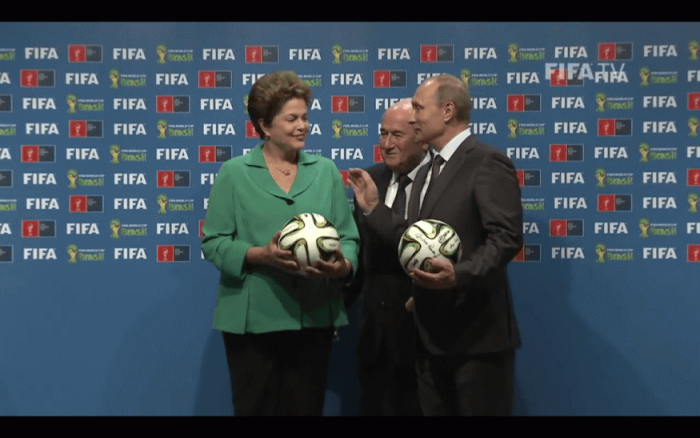
The FBI’s move against seven FIFA officials on charges of corruption is seen by most countries as a desperate Western effort to isolate Russia and re-open the bids for the 2018 and 2022 World Cups.
Forget the analogies about football being more important than life and religion. The Beautiful Game has always been all about politics among nations – on and off the pitch. And now, it’s reaching Cold War levels.
On Friday, as soon as Sepp Blatter was elected president of the international football federation (FIFA) for another term, he was surrounded by African delegates, who shook his hands, hugged and kissed him.
Then came the Asians followed by Latin Americans. Earlier, when Blatter delivered his victory speech – a breathless jumble of platitudes — delegates from Africa, Asia and Latin America, Russia and Oceania gave him a standing ovation.
For a man who had been declared dead by the Western media just 24 hours ago, it was an incredible resurrection.
At FIFA’s convention hall in Zurich, as Blatter was being feted by the big bosses of regional and national federations, his challenger Prince Ali bin al-Hussein of Jordan sat in the front row with a long face.
Giving him company in sorrow was Michel Platini, the former French footballer and president of the European football federation (UEFA). After the Jordanian conceded defeat, Platini look shattered, trying to figure out what went wrong.
A day earlier, the Frenchman had hailed Prince Ali as the great hope for football and an antidote to corruption because “he is a prince and he doesn’t need the money”.
But few delegates, except UEFA members and their American partners, bought Platini’s theory.
This was FIFA’s bloodiest election ever. With the 209 members of the football body divided into two camps – Europe (minus Russia and Spain) and North America versus the rest of the world – it was clear that a winner would emerge only after some serious bloodletting.
But just two days before the Blatter-Prince Ali face-off, the United States weighed in with full force as the Federal Bureau of Investigation arrested seven high-ranking FIFA representatives on corruption charges following a raid on their Zurich hotel.
Soon after the officials – all from Central and South America – were taken into custody, US attorney-general Loretta Lynch called them “criminals” and demanded that the World Cup allotted to Russia (2018) and Qatar (2022) be cancelled.
But a day is a long time in football politics. Twenty-four hours after Lynch’s barbs against FIFA and Blatter, the Swiss football administrator was back in control.
On Saturday morning, he blasted the US for “targeting” football’s world body and slammed Europe’s football bosses for a “hate” campaign.
Corruption is real, so is geopolitics
It’s an open secret that there is rampant corruption in football – at all levels. It’s no state secret that FIFA is run like the most private of private clubs with little public accountability.
Though all football federations and officials had been aware of the American investigation into allegations of bribery, going back to 1991, nobody expected early morning raids and arrests.
The raids were strategically timed, but if the purpose of the arrests was to make Blatter’s backers fall in line, it backfired.
“It happened like an intelligence operation. Our phones were tapped. The police came to the hotel and picked these officials up as if they were being kidnapped,” says a Brazilian football federation (CBF) official, speaking on condition of anonymity.
“Why arrest them just 24 hours before the election? They were not running away. Why did the cops come with three American journalists in tow? FIFA is based in Switzerland.
All its official business is done in Switzerland. How come the Americans suddenly jumped into it even as a Swiss probe in going on?” he asked.
As soon as news of the arrests spread among the delegates at the Zurich hotel, officials of various federations went into emergency meetings.
“The Europeans did not have the courage to arrest anyone. So they called the Americans to force everyone to vote for Prince Ali. It was clear to us that they wanted to get rid of Blatter and put their stooge in his place,” says the Brazilian who was in Zurich, when the drama unfolded.
“As things turned very ugly, even those of us who had doubts about Blatter’s leadership decided to vote for him?”
Blatter, even in his own words, is not perfect. Far from it. A smooth operator and great survivor, he has friends and enemies in equal numbers.
But why has this Swiss man suddenly become a villain for Europe and the US? Has Blatter damaged the Beautiful Game more than his predecessors, who too had to bow out in disgrace, in his 17 years at the helm? Why are the Americans so interested in “cleaning up” a game that has been managed mostly by Europeans so far?
Blatter’s main crime may not be corruption. It could be his reluctance to play geopolitical games as demanded by Europeans and Americans that has suddenly made him a villain.
Blatter’s problems with the US began in 2005 when he declined the then US Secretary of State Condoleeza Rice’s demand for Iran be thrown out of the 2006 World Cup as part of sanctions against the Asian country.
Things became worse when the Palestinians were allowed to join the global football association.
“While Blatter has been trying to make football bigger and better by taking it to all parts of the world, the Europeans have been worried about losing control. For Americans, the game is an instrument of their politics and Blatter became a hurdle in it,” says the Brazilian official.
With 209 members, FIFA is bigger than the International Olympic Committee as well as the United Nations.
But it has been dominated by Europeans for most of its history. Under Blatter, things changed dramatically as he took the World Cup to new regions, especially to emerging countries.
“The past two editions of the World Cup have been played in South Africa and Brazil. The next one is in Russia. All three are BRICS countries. It’s obvious that the west is not very happy with this. All this talk about corruption is an attempt by Europe and America to bring the game back into their sphere of influence,” says Thiago Cassis, a reputed Brazilian football writer.
“There is a lot of corruption in European football too. They do not talk about it. This whole game is not about tackling corruption, but regaining control.”
In the good old days of European domination, nobody could have imagined that the World Cup would one day go to Africa, as it did in 2010, or that three emerging countries would host the mega-event back-to-back.
Now with China eyeing the 2026 tournament, which the US also wants to host, there is panic in the West as the emerging countries, with their growing economies and huge TV audiences, threaten to take the game away from them.
Even India, which has been given the Under-17 World Cup in 2017, may make a bid for a future World Cup.
Enter the FBI
This change has happened because of Blatter’s efforts at making football a truly global sport.
Under him, FIFA has invested millions of dollars in infrastructure and projects in Africa and Asia.
Despite the western media dubbing this as Blatter’s way of “buying” influence and indulging in corruption, the delegates from these regions stood by him on Friday.
They have seen some real change in their part of the world. “Blatter himself has always been a strong supporter of the African and Asian countries in football.
He’s basically broken with the duopoly that Europe and Latin America traditionally had in the sport.
He has made it more global and he has brought in people from these two vast regions, and they are grateful to him, and they support him,” Alexander Mercouris, international affairs editor for Russia Insider magazine, said in an interview just after the FIFA vote.
On Thursday, as the western media was providing running commentary on the “storm” in FIFA and baying for Blatter’s blood, 47 members of the Asian Football Confederation and the 54-member African Football Confederation declared their support for him. The South and Central American federations, some of whose members were not so sure about their support to Blatter, also decided to back him after the hotel raid. “Why did they arrest officials only from our federations and that too in Switzerland? Why didn’t they approach our governments through Interpol? Is it because they knew that extradition from South America to US is impossible?” asks a CBF official.
There was also anger about reports in the western media about the CBF chief Marco Polo Del Nero “fleeing” Zurich for Brazil as he “feared” arrest. In fact, when papers like the Guardian and New York Times were reporting Del Nero’s “escape” from the FIFA meeting, the Brazilian official was still in Switzerland. “They brought all this pressure on us to force us to vote for Prince Ali. They have been lobbying with us for months. When they didn’t see it working, they conducted the raid followed by veiled threats to others that they could be arrested too. Some British and American journalists were part of this pressure tactic,” the Brazilian official alleged.
From the versions of the Zurich raid given by some South American officials, it appears that the FBI, Swiss police and a few western reporters hunted them together. “As the Asian and African vote was solidly behind Blatter, they wanted the votes from the Americas for Prince Ali. They were desperate to make the prince the new chief of FIFA as he could re-open the bids for the 2018 and 2022 tournaments,” says a Paraguayan official who was in Zurich on the day of the drama. “Since the UK and the US lost the 2018 and 2022 bids respectively, they have been working to somehow cancel the World Cups in Russia and Qatar. They haven’t accepted the fact that they lost the bids in a fair contest.”
It is difficult to say if there was no corruption in these bids or that none of the arrested officials were involved in bribery. But there is also an element of truth in the allegation that Western governments and federations have been working together to tarnish the process by which Russia and Qatar won the right to host the event.
On Thursday, soon after the news about the arrests in Zurich broke out on wires, Ryu Spaeth, a columnist for The Week magazine, in an article titled “Why the next World Cup should be held in the U.S.A” said that the “bidding must be done again, and if it is too late, then the World Cups in 2018 and 2022 should be hosted in countries that already have the infrastructure to absorb a massive sporting event, such as the United States, which was among the countries that lost the 2022 bid to Qatar.”
This was very much in line with the official US position on the World Cup in Russia. Basking in the glory of the FBI’s move, Lorreta Lynch had made a similar demand on Thursday. In fact, neoconservative commentators in the US have been training their guns at Russia for quite some time. The attacks have become more intense since last year’s Ukrainian crisis which resulted in Crimea’s “accession” to Russia and Ukraine turning into almost a failed state. In recent weeks, Republican hardliner John McCain repeatedly called on FIFA to “oust” Blatter because of “his continued support for Russia.” According to Neil Clark, a British journalist, Blatter has been in the American firing line because he “went to Moscow not that long ago and said that there was no question of the World Cup being taken away from Russia.”
Power, money and partnership
With Russia still under Western economic sanctions following the Crimean takeover, the US is keen to further squeeze Moscow and deny it a chance to showcase its soft-power to a global television audience of a billion-plus people. Besides, there is serious money at stake. The World Cup is the most lucrative sporting event in the world, eclipsing even the Olympics. The 2014 qualifying rounds and final tournament brought in $4.8bn over four years and it gave a much-needed boost to small businesses and tourism in Brazil, besides creating a positive image of the country for millions of foreign visitors. A similar boost for the Russian economy and its image in the world could negate the West’s efforts to isolate Russia in the international community.
While the Americans have their geopolitical games to play, the Europeans are concerned about power. Dependent on South America and Africa for football talent, and, increasingly Asia for TV audiences, the Europeans know they are losing control. “Europe wants to import all the labour from us because that gives them a global TV audience and lots of money. But they do not want to give us World Cups or share any power with us,” says an African delegate who voted for Blatter.
Demonised in Europe and the US, Blatter remains popular outside the West because he took football where no other FIFA boss dared to. “The game is for the poor, not for the elite. And Blatter brought it to them in Africa, in Asia, and that’s why most of Africa and Asia voted for him,” Talal Badr, President of Union of Arab National Olympic Committees, told journalists on Saturday. “We don’t like governments to interfere with sports or federations. We don’t want these governments to control the results or impose on us where the game goes,” Badr added.
Whether or not Blatter is involved in corruption can only be revealed by an honest probe. The FBI investigation may become bigger and indict him later. For the present, however, Blatter remains in command of world football as most countries believe what the ‘West’ is trying to do is rob ‘the Rest’ of the chance to be equal partners in the only truly global game.
Shobhan Saxena is an independent journalist based in Rio de Janeiro. He has covered the FIFA Confederations Cup in 2013 and the FIFA World Cup in 2014, besides writing extensively on Brazilian and South American football






